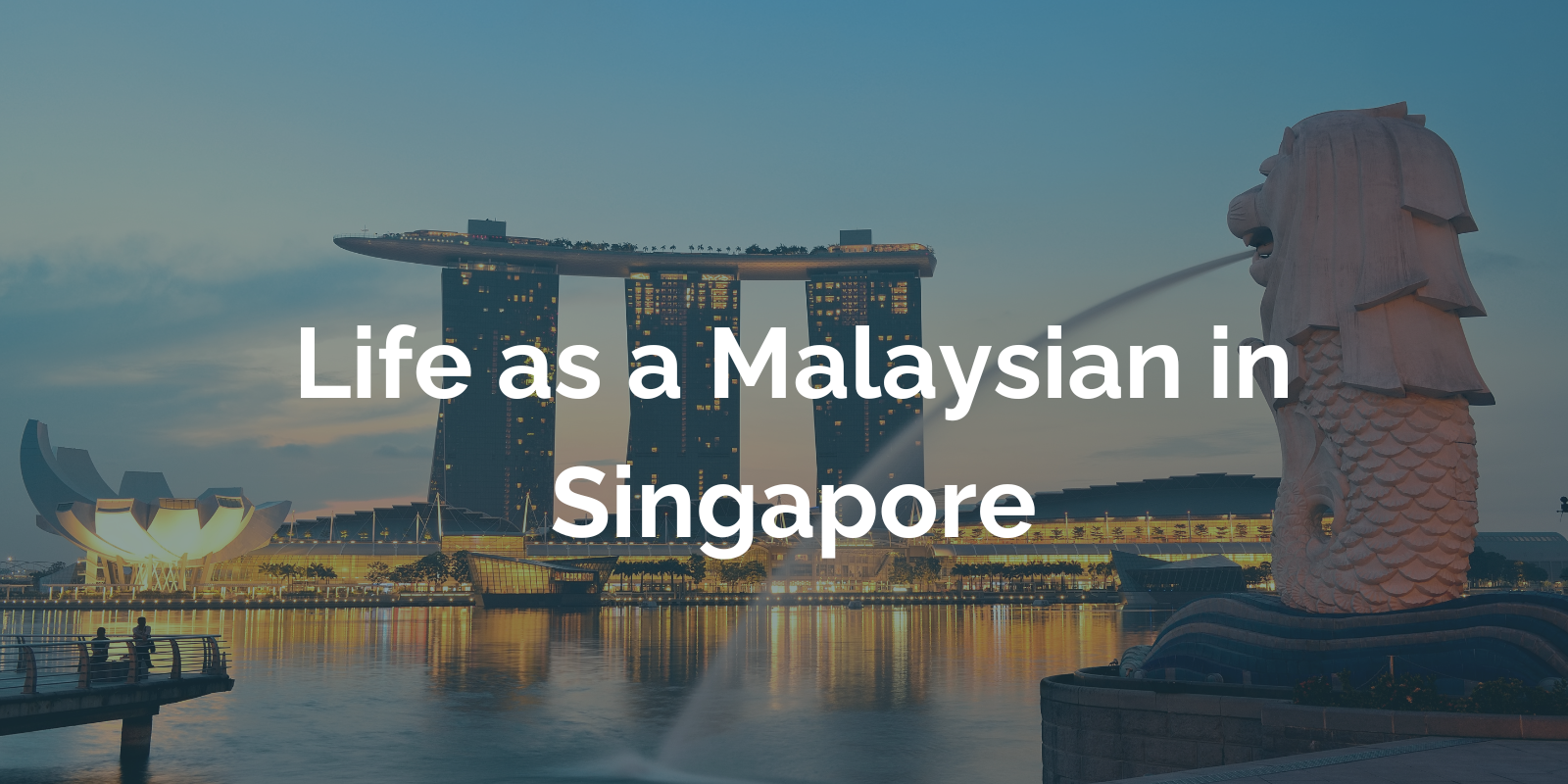Malaysian Working in Singapore: My Experience
I’ve noticed an intriguing trend in my personal life over the past year – every few months or so, I hear of another Malaysian friend moving to Singapore. So much so that Singapore is starting to feel like home with so many familiar faces from my childhood and college days just a 30-minute train ride away.
If you’re a keen observer on social media, you too might have noticed more stories of Malaysians packing their bags and crossing the border to Singapore.
There are MANY Malaysians working in Singapore. This statistic truly underscores the scale of this migration: As of 2022, 1.13 million out of 1.86 million Malaysians who chose to migrate overseas live in Singapore.
With more than 1 million Malaysians in the lion city, it’s almost impossible not to bump into another Malaysian here. And it’s always fascinating to speak to fellow Malaysians about their experience living in Singapore.
Some people enjoy it here, others hate the experience and can’t wait to go back to Malaysia, and some are indifferent.
MalaysianPayGap did an insightful series on Malaysians working in Singapore and Mr Money TV had a great interview with Wei Choon of The Woke Salaryman covering the topic.
Having lived in Singapore for close to 5 years now, I thought why not chip in on the conversation too? If you’re considering moving to Singapore, perhaps my experience and perspectives can shed some light on the realities of living in this city-state.
First, why move to Singapore?
A chance to live abroad
For the longest time, I wanted to experience life beyond Malaysia. During my uni days, I went on a summer exchange to the US. It was my first time sitting on a plane and leaving the country!
For two months, I lived in a rural university town in Indiana. I got to mingle with the locals and live a “normal” life in that town. It was a glimpse into what life would be like if I lived there one day.
After university, I toyed with the idea of moving to Singapore (or somewhere else) but didn’t take action.
It wasn’t until I took my first career break and backpacked solo through Europe that I finally decided, “Yep, I want to get out of Malaysia and try living somewhere else for a while”.
Initially, Singapore wasn’t at the top of my list. I wanted to move to Europe – y’know, go somewhere completely out of my element. But I had little success in landing a job in Europe. So, I turned my focus on exploring opportunities in Singapore.
I landed a job within two weeks of starting my job search. I consider myself very, very lucky to have gotten a job that quickly and through a job board, no less because many people take at least 6 months to a year to get a good offer in Singapore.
I was excited about the new possibilities – living in a new city, a chance to reinvent myself, meet new people, and gain valuable life experiences. Suddenly, the world became a much smaller place and I didn’t have to just look in my own backyard for opportunities.
But I realise my enthusiasm isn’t one that’s shared by all Malaysians who move to Singapore. For some Malaysians, working in Singapore is just a means to an end (more on this later), and I think that’s why some of us end up feeling quite miserable here.
Earning income in a strong currency
The biggest allure of working in Singapore is earning 3 times what you would in Malaysia for the same skills and the same amount of hours put in.
As a financial decision, it’s practically a no-brainer to take a job across the Causeway. Even if it means leaving your family and life behind in Malaysia.
That’s because working in Singapore helps speed up wealth building in a way that slogging it out to climb the corporate ladder in Malaysia may not be able to.
A lot of Malaysians working in Singapore are engaged in a form of geo arbitrage – earning income in a strong currency and using that income to spend or buy assets in a lower-cost economy.
If you save S$150,000, you’ll have half a million in Ringgit in savings if you decide to move back to Malaysia.
I know enough Malaysians working in Singapore who bought a home and a car, paid off bad debts and are able to support their ageing parents in Malaysia and their kids’ education overseas.
I myself was able to help pay my family’s bills back in Malaysia, pay off my car loan, and help pay for my sister’s master’s program, all while still being able to travel and save money at the same time.
Granted it is no easy feat, but it’s a lot more doable when you’re earning in a currency that is stronger relative to your home currency.
Accelerate my career growth
Compared to Malaysia, I would say Singapore has a lot more opportunities to learn and grow fast in your career.
Yes, you can grow in your career in Malaysia too. But I think the advantage Singapore has as a global economic hub means that, on the whole, technologies, innovation, and expertise arrive in Singapore a lot sooner than in Malaysia.
If you’re in banking, for instance, you have greater exposure to complex products, global markets, and bigger and international deals.
Most multinational companies also set up their regional office in Singapore so you get more opportunities to vie for regional roles, rather than a local market role.
On the flip side, competition in the job market is stiff in Singapore.
You’re not just competing with Singaporeans for work. There are plenty of other qualified and talented Southeast Asians who are also looking to benefit from the strong Sing Dollar. Not to mention, you’re also contending with the Western expats who tend to be favoured for senior positions even if you’re just as qualified as they are (not all the time, but it happens enough for it to be noticeable).
Most people view competition as a negative thing. But I feel that the competitiveness in Singapore trains you to pick up new skills and knowledge at a faster pace. The key is to have a growth mindset – constantly thinking of how to grow and improve will help you stay relevant in the marketplace.
Reflecting on my growth, I can say that I’ve gained so many valuable and difficult work experiences since moving to Singapore.
For example, I’ve learned how to manage interpersonal relationships with colleagues and bosses from many different backgrounds and cultures and how to handle sales and clients in regional markets, even at a relatively small company.
I don’t think this kind of opportunity for exposure would have come my way as easily back in Malaysia.
Relatively affordable cost of living
The affordability of the cost of living in Singapore is a contentious point. Some people say Singapore is too expensive, others say the cost of living is manageable.
In Singapore, my single biggest expense is rent, and for Malaysians, this is what makes Singapore expensive.
When I moved to Singapore in 2018, the rent for an entire 3-bedroom HDB flat ranged from $2,000 to $3,500 a month. In recent years, rents have gone up even more! Just in 2023 alone, HDB rents have shot up by at least 20%.
By contrast, if you want to rent in Selangor, you can find a landed 2-storey house going for less than RM3,500.
Singapore is a tiny island with land being a scarce resource, so rents and property prices will always be higher than in Malaysia. That’s the reality of living in a rich city-state. So most of us make do with renting a room or sharing a flat with other people.
But aside from rent, I’ve found that my cost of living is lower in Singapore than in Malaysia when looking purely at my necessary expenses. (P.S. I wrote a living expenses guide for Malaysians working in Singapore if you’re curious to know how much you’ll need)
Although I lived with my parents back in Malaysia (and didn’t need to pay for rent), I spent the bulk of my money on my car. All in all, including the car loan repayments, fuel, toll, parking, insurance, and maintenance, I easily spent north of RM1,500 a month owning a car.
In Singapore, I don’t own a car, and frankly, there’s no need for one because of how easy it is to travel with public transport here.

When it comes to food, I’ve found that groceries tend to be cheaper in Singapore (dollar-to-dollar). A week’s worth of groceries will cost me about S$30 in Singapore whereas I usually spend about RM100 a week on groceries in Malaysia.
Though I don’t drink coffee, I know that a cup of Starbucks coffee costs about $8 in Singapore. In Malaysia, it is RM20, what??
With a strong Sing Dollar, purchasing power is also relatively higher in Singapore. I used to think thrice before buying something from Uniqlo (even when I really needed the item). Now I only think twice, heh.
So yeah, I would argue that you can live a relatively decent life on a median income in Singapore than in Malaysia.
Living in Singapore comes with its challenges too
Not having a support system
Part of what makes life challenging in Singapore (or anywhere else for that matter) is not having the same support system that you have at home.
I mentioned earlier that some Malaysians working in Singapore view it as a means to an end and by doing that, they neglect to build a support system in Singapore.
No matter how fiercely independent you think you are, without a support system, you’ll feel miserable.
When you move anywhere new, you’ll have to make a little effort to find your people. Whether that means going to events, joining a running group, or simply reaching out to relatives or acquaintances who’ve moved here too.
I was lucky enough to know some friends in Singapore before I moved, which made the transition easier. Having said that, throughout my time here, I made friends through work, going to parties, joining events, and even on dating apps.
I don’t think it is that difficult to make friends here because there are so many foreigners who share the common experience of moving to a new place and are looking for new friends too.
But the difficulty lies in keeping those friendships as people get busy with work or move away to other countries (or back home) after a few years.
It can get stressful working in Singapore
Before I moved, I would hear stories about how Singapore is a stressful place to work.
To a certain extent, it can get stressful. There is definitely a culture of kaisuness here in the workplace. In some corporate settings, especially in sales, you’re in direct competition with your colleagues and this is encouraged by the bosses.
In addition, many companies in Singapore still have a very top-down culture, where directives are dictated from high, even if it makes things more inefficient.
So you may end up in situations where you’re running a project that gets bloated and hard to manage as time goes on, and if the project gets delayed or has issues, you’re accountable for it, even if you were just doing what the bosses wanted.
Interestingly, employees in Singapore spend a lot of time in “performative work”, which basically means Act Busy Only. Make of that what you will.
Even so, there are still organisations, like MNCs, that prioritise work-life balance and have a more collaborative structure.
I have had periods of high stress working here but I think it’s more down to the nature of the companies that I worked in and my own high-achieving tendencies.
Malaysia’s advantage over Singapore
Singapore is a great place to earn an income but I’d argue that Malaysia is a great place to start a business.
There are four simple reasons:
- Malaysia still has an abundance of natural resources and human capital
- Malaysia is a much larger market compared to Singapore
- There are more inefficiencies and gaps in the market which means that you can build a product or service to solve for those issues
- Malaysians are hardworking and have an entrepreneurial spirit
However, the problem remains that so many high-achieving talents have left Malaysia because of the lack of recognition of their talents and the underutilisation of their talents. For years, Singapore has been poaching talented Malaysians through scholarship programs and attractive job placements.
So if you do end up starting a business in Malaysia, you may not get the best talents for your business.
Will I return to Malaysia?
This is a question that I don’t have an answer for right now.
On the whole, I enjoy living in Singapore. Again, I consider myself one of the lucky ones who managed to get jobs where I earn a decent income, learn new skills, and be able to grow. I was able to transition to life in Singapore fairly easily because I had friends here and naturally sought out people to socialise with.
But I don’t think I would call Singapore a permanent home. It is a home, for now. On the other hand, Malaysia is also feeling less and less like home to me too.
Lately, I’ve been thinking about moving to another country instead. Some places I have in mind are New Zealand and Taiwan.
I quite like the idea of being a global citizen, living in one place for an extended period before packing it all up and moving somewhere else.
I’m not sure where I’ll end up in the future but I’ll say that moving to Singapore gives me confidence in my ability to adapt to a new environment and deal with change and uncertainty well.
If you’re a Malaysian working in Singapore, what has your experience been like? If you’re thinking about moving to Singapore, what are some of your concerns? Share it in the comments, or drop me a message on Facebook, Twitter, or Instagram.







Thanks for the info
Thanks for your sincere sharing🤗🙏🏻